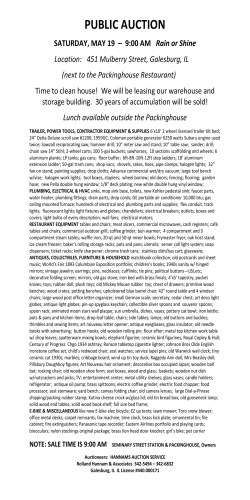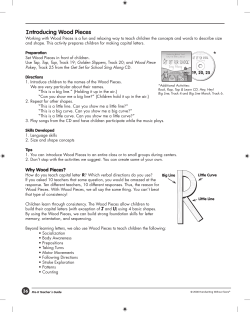
Why and how to test your wood pellets Chemical Analysis
Chemical Analysis Why and how to test your wood pellets Why test wood pellets Private household use of wood pellets has a large market share. To these customers a high quality fuel and confidence in the product matters. As regards large customers as e.g. heating plants, the quality needs not necessarily be high, but it has to be specified out of consideration for operational performance. For producers and dealers it is a matter of monitoring the quality of the produced and traded wood pellets - to assure the customers’ confidence in the product and to counter complaints. Large customers should perform quality control of deliveries, especially when buying pellets from new players in the market. What is a high quality wood pellet High quality wood pellets are pellets which can be used in both small and large boilers without problems and only produce a minimum of ash. To meet these requirements pellets should be made from pure and untreated wood without bark and without use of additives. The European standard EN 14961-1 Solid biofuels – Fuel specifications and classes – Part 1: General requirements describe the principles in general for the specification of solid biofuels regarding origin, form and properties. Regarding origin (source) the specification is based on an up to 4 digit code; for instance means 1.2.1.2 chemically untreated woody biomass residues without bark from wood processing industry. In the European standard EN 14961-2 Solid biofuels –Fuel specifications and classes - Part 2: Wood pellets for non-industrial use wood pellets are further classified into 3 grades. A small extract of the specifications in this Part 2 is reproduced in the Table 1 overleaf – just to show the principle. Property class: Origin (code cf. EN 14961-1): Moisture, w-%: Ash, w-% dry: Sulfur, w-% dry: Net calorific value, MJ/kg as received: Mechanical durability, w-% (intact pellets): A1 A2 B 1.1.3 and 1.2.1 Max. 10 Max. 0,7 Max. 0,03 1.1.1, 1.1.3, 1.1.4, 1.1.6 and 1.2.1 Max. 10 Max. 1,5 Max. 0,03 1.1, 1.2 and 1.3 Max. 10 Max. 3,0 Max. 0,04 16,5 - 19 16,3 – 19 16,0 – 19 Min. 97,5 Min. 97,5 Min. 96,5 Table 1. Some of the specifications given in EN 14961-2 How to test the pellet quality The European standard EN 14961-2 lists the standards (or technical specifications) for the determination of the specified chemical and physical fuel properties. In order to compare different wood pellets offered on the market, it is important that specified values of fuel properties are comparable. For example, EN 14961-2 specifies the method described in EN 14775 for determination of ash. By this method the ash content is determined by heating a sample to 550 °C under specified conditions, and the obtained result is not necessarily comparable to results reached by other methods (as e.g. international or national coal standards using 815 °C in the heating process). FORCE Technology’s fuel laboratory offers to determine the properties of wood pellets according to the methods specified by EN 14961-2, among others: • • • • • Content of moisture and ash Gross and net calorific value Content of sulphur (S) and chlorine (Cl) Mechanical durability Bulk density. How many and what properties to be determined depend on the purpose of the testing. Even wood pellets that are believed to be of high quality may cause slagging problems in the boiler, e.g. due to contamination of the raw material. Preparing a sample of 1 g to determine calorific value This may call for further investigation such as determination of ash melting behaviour and content of the different ashforming elements in the pellets. FORCE Technology also offers services as e.g.: • • • • Determination of ash melting behaviour according to the European specification, CEN/TS 15370-1. Determination of the content of major and minor elements by traditional wet chemical analysis. Screening by ED-XRF technique for contents of elements (from atomic number no. 11, Sodium). Consultancy by experienced specialists within fuel characterization and fuel utilization. Competences FORCE Technology is a member of the GTS – Advanced Technology Group, which is a grouping of Danish independent research and technology organisations, approved by the Danish Ministry of Science, Technology and Innovation. Sample preparation – an important step in testing FORCE Technology has many years of experience and expertise within utilization and testing of solid fuels and is accredited by the Danish Accreditation, DANAK, for the testing of solid mineral and solid biomass fuels. The laboratory is an active participant in the on-going standardization work within the area of testing of solid biofuels (CEN/TC 335 and ISO/TC 238). Further information Susanne Westborg: Tel. +45 43 26 76 73 / E-mail: [email protected] Rene Hansen: Tel. +45 43 26 76 64 / E-mail: [email protected] FORCE Technology • Headquarters • Park Allé 345 • 2605 Brøndby • Denmark • Tel. +45 43 26 70 00 • [email protected] • forcetechnology.com 2907-3-en: Subject to changes without notice
© Copyright 2026





















